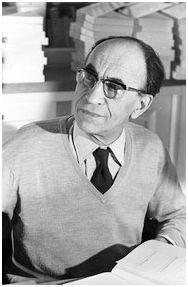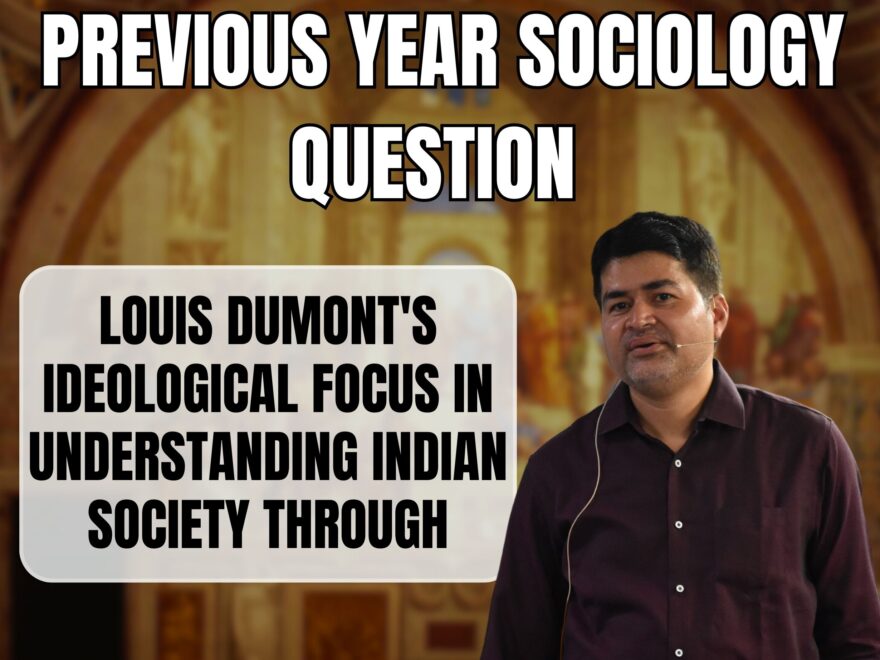How do you justify Dumont’s deliberate stress on ideology that produced Intellectualized account of Indian society?
(Paper: 2, Section: A, Year 2020, Unit 12: Social Structure, Caste System)

How do you justify Dumont’s deliberate stress on ideology that produced Intellectualized account of Indian society?
(10 Marks)
|
Introduction: Introduce the HOMO HIERARCHICUS Main Body: Basics About Dumont’s Emphasis on Ideology, Justification of Dumont’s Stress on Ideologies, Justification of Dumont’s Stress on Ideologies Conclusion: Dumont Stressing on Other Applicability of Other Viewpoints |
Introduction
Louis Dumont, a French anthropologist, is known for his deliberate focus on ideology and intellectualized accounts in his HOMO HIERARCHICUS particularly in the context of Indian society. He sees Indian society not just as a system of relationships but as one of ideation, value patterns, or cognitive structures.
Main Body
Dumont’s Emphasis on Ideology:
- Dumont’s standpoint asserted that ideologies transcend mere reflections of material circumstances; they form unique systems of thought and values, actively influencing the foundations of social structures.
- He contended that a comprehensive comprehension of Indian society mandates an exploration of the underlying ideological convictions and principles that sustain and perpetuate it.
- This approach stands in contrast to reductionism, which narrowly focuses on empirical data, favouring instead a comprehensive understanding of social phenomena through the ideological prism.
Justification of Dumont’s Stress on Ideologies:
- Deep Understanding of Social Structures: By emphasizing ideology, Dumont aimed to delve into the underlying beliefs, values, and norms that shape social structures. This approach allows for a more profound understanding of how society functions beyond surface-level observations. Dumont’s analysis of the ideology of renunciation sheds lights on the values and norms associated with asceticism and the spiritual quest.
- Relevance of Ideas: Dumont recognized that ideologies play a pivotal role in shaping social hierarchies and relationships. In many societies, including India, ideas about purity, pollution, and hierarchy deeply influence everyday life. Exploring these ideas can provide valuable insights into social dynamics.
- Deeper Cultural Context: They provide a deeper cultural context, allowing for a nuanced interpretation of cultural practices and beliefs. For example recent debates surrounding temple entry of menstruating women can also be better analysed by ideology of pollution of purity and thus reformation by changing such ideologies.
- Critique of Euro – centrism: Dumont’s focus on ideology challenged Eurocentric perspectives that often dominated sociological studies. By examining non-Western ideologies, he contributed to a more inclusive and diverse anthropology, acknowledging the importance of understanding cultures on their own terms.
- Intellectualized Accounts as a Bridge: Dumont believed that intellectualized accounts could serve as a bridge between cultural concepts and academic analysis. By engaging with and interpreting complex ideologies, can make these ideas accessible and relatable to a wider audience.
- Holistic Understanding: Dumont’s approach promotes a holistic understanding of societies. He argued that intellectualized accounts could reveal the interconnectedness of various aspects of culture, such as religion, politics, and kinship.
- Interdisciplinary Insights: Dumont’s emphasis on ideology encourages interdisciplinary collaborations. By engaging with ideas and concepts from philosophy, sociology, and other fields can gain a more comprehensive understanding of the societies they study.
Critiques and Constraints of Dumont’s Approach
- Oversimplification: Detractors contend that Dumont’s exclusive emphasis on ideology tends to oversimplify the intricate nature of Indian society. It may not fully account for the dynamic interplay of economic factors, which also significantly influence social relationships. For instance, the complexities of the caste system cannot be comprehensively explained by ideology alone, as economic considerations shape power dynamics and social hierarchies.
- Neglect of Material Conditions: Relying predominantly on ideology may lead to a neglect of the critical economic disparities that contribute to social hierarchies. Material circumstances and access to resources play a substantial role in shaping power relations within Indian society. Ignoring these material aspects can result in an incomplete understanding of the structure of social dynamics.
Conclusion
In the words of Dumont himself, “Ideology offers us a window into the soul of a society, but it should not be the sole lens through which we perceive it.” Integrating the study of ideology with other sociological perspectives and considering material factors will undoubtedly lead to a more comprehensive and nuanced understanding of the intricacies of Indian society.
Related Blogs …
To master these intricacies and fare well in the Sociology Optional Syllabus, aspiring sociologists might benefit from guidance by the Best Sociology Optional Teacher and participation in the Best Sociology Optional Coaching. These avenues provide comprehensive assistance, ensuring a solid understanding of sociology’s diverse methodologies and techniques.
META TAGS:
Louis Dumont, Louis Dumont sociology, HOMO HIERARCHICUS, Indian Society, Ideology, Louis Dumont thinker, Social Structures, Cultural Context, Eurocentrism, Intellectualized Accounts, Anthropology, Interdisciplinary Insights, Holistic Understanding
Why Vikash Ranjan’s Classes for Sociology?
Proper guidance and assistance are required to learn the skill of interlinking current happenings with the conventional topics. VIKASH RANJAN SIR at TRIUMPH IAS guides students according to the Recent Trends of UPSC, making him the Best Sociology Teacher for Sociology Optional UPSC.
At Triumph IAS, the Best Sociology Optional Coaching platform, we not only provide the best study material and applied classes for Sociology for IAS but also conduct regular assignments and class tests to assess candidates’ writing skills and understanding of the subject.
Choose The Best Sociology Optional Teacher for IAS Preparation?
At the beginning of the journey for Civil Services Examination preparation, many students face a pivotal decision – selecting their optional subject. Questions such as “which optional subject is the best?” and “which optional subject is the most scoring?” frequently come to mind. Choosing the right optional subject, like choosing the best sociology optional teacher, is a subjective yet vital step that requires a thoughtful decision based on facts. A misstep in this crucial decision can indeed prove disastrous.
Ever since the exam pattern was revamped in 2013, the UPSC has eliminated the need for a second optional subject. Now, candidates have to choose only one optional subject for the UPSC Mains, which has two papers of 250 marks each. One of the compelling choices for many has been the sociology optional. However, it’s strongly advised to decide on your optional subject for mains well ahead of time to get sufficient time to complete the syllabus. After all, most students score similarly in General Studies Papers; it’s the score in the optional subject & essay that contributes significantly to the final selection.
“A sound strategy does not rely solely on the popular
Opinion of toppers or famous YouTubers cum teachers.”
It requires understanding one’s ability, interest, and the relevance of the subject, not just for the exam but also for life in general. Hence, when selecting the best sociology teacher, one must consider the usefulness of sociology optional coaching in General Studies, Essay, and Personality Test.
The choice of the optional subject should be based on objective criteria, such as the nature, scope, and size of the syllabus, uniformity and stability in the question pattern, relevance of the syllabic content in daily life in society, and the availability of study material and guidance. For example, choosing the best sociology optional coaching can ensure access to top-quality study materials and experienced teachers. Always remember, the approach of the UPSC optional subject differs from your academic studies of subjects. Therefore, before settling for sociology optional, you need to analyze the syllabus, previous years’ pattern, subject requirements (be it ideal, visionary, numerical, conceptual theoretical), and your comfort level with the subject.
This decision marks a critical point in your UPSC – CSE journey, potentially determining your success in a career in IAS/Civil Services. Therefore, it’s crucial to choose wisely, whether it’s the optional subject or the best sociology optional teacher. Always base your decision on accurate facts, and never let your emotional biases guide your choices. After all, the search for the best sociology optional coaching is about finding the perfect fit for your unique academic needs and aspirations.
Follow us :
🔎 https://www.instagram.com/triumphias
🔎https://www.youtube.com/c/TriumphIAS
https://t.me/VikashRanjanSociology
Find More Blogs
|
Scope of the subject and comparison with other social sciences |
|||
|
|
|
|
Modernity and social changes in Europe |


2 comments